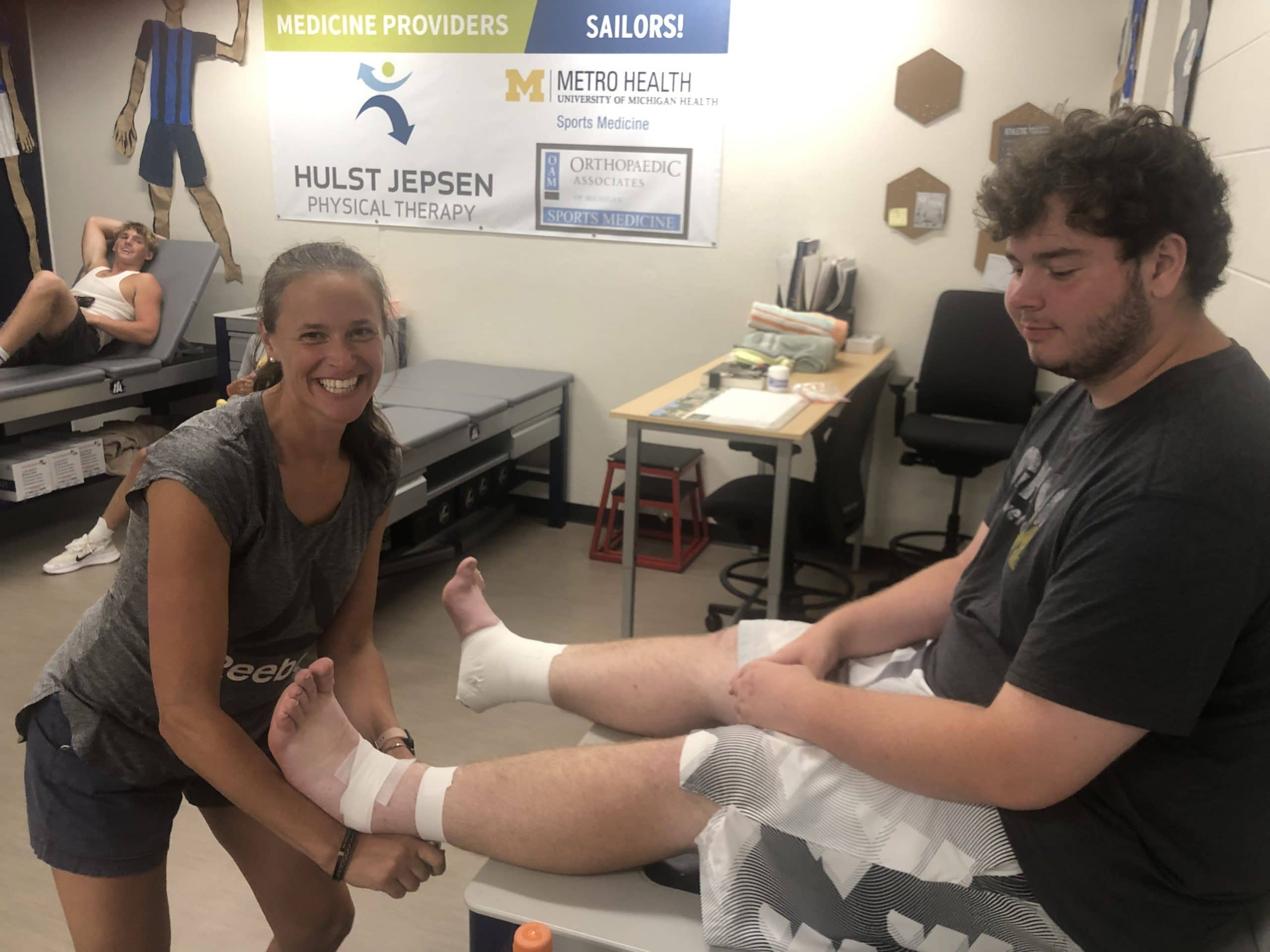Sports Injuries & Mental Health

As a Certified Athletic Trainer at South Christian High School and Hulst Jepsen Physical Therapy in Grand Rapids, Michigan, usually I get to talk about the parts of my job that I love but today I get to discuss mental healing and sports injuries! Today we are doing something a little different. We are talking about the hard stuff, the nitty-gritty. Today we are going to be real with each other. There are days I get to help kids stay on the field, play their game, and celebrate their successes. On other days though, athletes get hurt, knees blow, heads are concussed, bones break, and seasons end; that is reality. In school, we learn so much about recognizing injury, reacting appropriately, and helping people heal from the physical aspects of injuries but where we lack is helping with the mental healing.
Just like a Physical Injury, There are Steps to Mental Healing:
1. Recognize the Injury
This is so hard! When a kid sustains a season-ending injury we expect there to be some signs, but these are not the only athletes that struggle. From the NCAA website: Mind, Body, Sport: How being injured affects mental health, “For some student-athletes, the psychological response to injury can trigger or unmask serious mental health issues such as depression, anxiety, eating disorders, and substance use or abuse.” The loss of identity as an athlete and teammate is well documented and understandable, these kids work hard to make and be part of a team and injury takes those expectations and changes their outlook. It is critical to be aware and look for signs such as:
- Sadness
- Isolation
- Irritation
- Lack of motivation
- Anger
- Frustration
- Changes in appetite
- Sleep disturbance
- Disengagement
2. React Appropriately
When a kid is injured physically, we need to know if it is a bandaid/taping situation or a 911 call for an ambulance. The same is true in mental health. I struggled with this as an athletic trainer. It is hard to know what are normal feelings of loss (needs a bandaid) and what is an acceleration of symptoms (needs a professional). Any acceleration of the above changes is a sign that the athlete may need further help from a mental health professional, and we need to break the stigma and help our athletes know that seeking that professional mental health professional is never wrong. It takes courage and emotional maturity.
I asked a local mental health professional once what to do for my athlete when they are expressing their losses, fears, and anger. The response feels like common sense to me now but then it was a revelation. Acknowledge and validate the loss and let them talk or even cry. This is NOT easy for me. I want to cheer people up, but I’m learning (slowly) to stop showing them the silver lining and to listen. I was told, “it is normal to feel sad when something is sad!” There will be ups and downs in both physical and emotional healing. Loss of sleep for a night or two and feeling anger and frustration are normal. Losing sleep for weeks and feeling in a constant state of anger or frustration is not normal. As for seeking help when it isn’t “needed” we send for x-rays to find out if there is a broken bone, why wouldn’t we check up with a professional for their brain?
It’s easy to want to fix things, to try and push past the pain with positive words, but sometimes the most powerful thing we can do is simply be there and listen. Healing, whether physical or emotional, isn’t linear, and recognizing the difference between temporary frustration and prolonged distress is crucial. That’s why access to support matters. With the rise of individual counseling for recovery, online therapy has made it easier than ever to check in with a professional before things spiral into something more serious. Just like we wouldn’t hesitate to get a medical scan for a potential injury, prioritizing mental health through professional guidance should be just as natural. Whether it’s working through a loss, managing stress, or simply learning better coping strategies, having a trained expert just a click away can make all the difference.
3. Help Them Heal
In physical injury, this looks like physical therapy, consistent check-ins, increased function, strength with the strength and conditioning staff, and return to play protocols. For mental health, it’s the same, continue to include them in team functions, daily check-ins, and knowing and using appropriate mental health resources. I worked with a student several years ago who tore her ACL her senior year and was in physical therapy with one of my wonderful colleagues at Hulst Jepsen Physical Therapy. She came in after her appointment and stated that she cried through her entire appointment, not from physical pain but emotional. Her physical therapist told her that she was in a safe space to feel anger and doubt and validated her. The young lady felt the strength after that to seek professional help and recovered and thrived later. I don’t think her physical therapist “fixed her” mental health but allowed her the space to feel and express her concerns. She was asked every visit how she was doing physically as well as mentally.
In situations where emotional recovery is intertwined with physical healing, exploring innovative treatments can be a pivotal step. Avesta Ketamine Wellness offers a specialized approach for individuals grappling with depression and anxiety, often accompanying significant physical injuries. Ketamine treatment has been recognized for its rapid and effective relief of severe mental health symptoms, providing a valuable resource for those in the midst of a challenging recovery journey.
Finding the right therapeutic support is crucial. For those seeking comprehensive care, it can be beneficial to trust PathWell Clinic. PathWell Clinic integrates a range of therapeutic approaches tailored to individual needs, ensuring that patients receive holistic and personalized care. By combining traditional therapy with innovative treatments, you can address both the emotional and physical aspects of your recovery, paving the way for a more complete and sustainable healing process.
As with physical injury, I know where to send a kid if they are injured, I know the resources available, the parents in the stands that are doctors/dentists/EMTs, etc. It is important to do the same in your school with mental health. What resources are available to your student-athlete? What programs, personnel, and protocols are in place to help overwhelmed individuals?
If you or someone you know is struggling with mental health after a sports injury or after the loss of their athletic season/career, please don’t hesitate to get help. Taking care of your mental well-being is just as important as taking care of your physical well-being. There are so many resources right in Grand Rapids, Michigan and in your local community:
https://kdl.org/community-resources/mental-health/.
Sources:
Putukian, M. (2014, November 5). Mind, body and sport: How being injured affects mental health. NCAA.org. Retrieved May 23, 2022, from https://www.ncaa.org/sports/2014/11/5/mind-body-and-sport-how-being-injured-affects-mental-health.aspx
